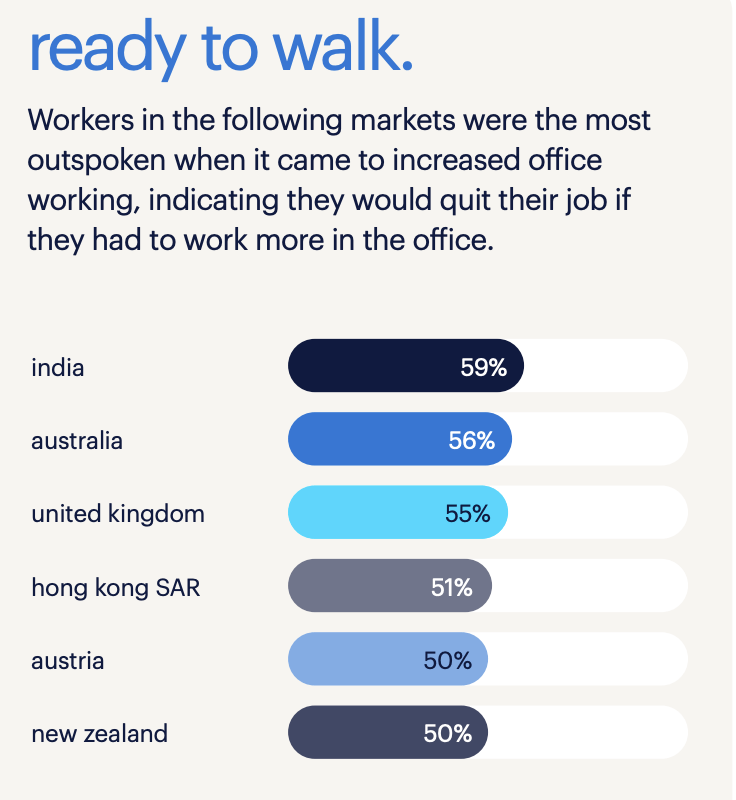The global workforce has undergone a profound transformation after the Covid-19 pandemic, reshaping traditional notions of work and redefining employee priorities. The recently released “Randstad Workmonitor 2024” study provides fascinating insights into the expectations and aspirations of Indian professionals spanning diverse sectors such as IT services, financial services, communications, and construction. Contrary to global trends, the majority of Indian workers feel content and satisfied in their current roles, prioritizing job flexibility over traditional avenues of career advancement.
A whopping 90% of Indian professionals, as against the global average of 56%, expressed ambition for their careers. Interestingly, 63% of these individuals express a keen interest in taking on more managerial responsibilities, indicating a strong inclination towards leadership roles. However, it is important to note that promotions alone do not serve as the primary driving force behind their career aspirations.
What sets the Indian workforce apart is the nuanced approach to career satisfaction. Amidst the pursuit of lofty goals, a noteworthy 56% of workers in India say, “If I find a role I like, I’m happy to stay in it, even if there’s no room to progress or develop.”
However, amidst this contentment, a significant 68% assert that they would consider leaving a job if it lacks opportunities for career progression, a percentage significantly higher than the global average of 35%. This dual perspective highlights the complexity of career aspirations among Indian workers, emphasizing both individual satisfaction and the pursuit of advancement.
Indians Prioritise Job Flexibility
Since the global outbreak of the Covid-19 pandemic in 2020, tech companies found themselves compelled to implement widespread work-from-home policies for all employees. Now that the pandemic has subsided, many companies have either completed or are in the process of concluding this work-from-home culture, citing concerns related to productivity and other challenges. Despite this, a majority of workers, not only in India but across the world, expressed a reluctance to return to the office every day. Strikingly, a significant 58% of surveyed Indian workers (compared to 39% globally) assert that working from home is non-negotiable for them. Instead, they seek more flexibility in both their working hours and location.
The top three most crucial factors in considering current or future employment are consistent across both India and the global workforce.
- Work-life balance takes the lead, with importance among 98% of workers in India and 93% globally.
- When it comes to considerations about pay, 96% of workers in India prioritize this aspect, in contrast to 93% globally.
- Job security also holds paramount importance for workers in India, with 95% highlighting its significance, and globally, 89% share this sentiment.
The study indicates that 63% of Indian workers wouldn’t accept a job if it would adversely affect their work-life balance, a sentiment shared by 57% globally. Another 66% express a willingness to quit a job if it hampers their overall life enjoyment, compared to 48% globally.
Surprisingly, employees in Indian companies aren’t just craving the comfort of a work-from-home setup, but also advocating ardently for a flexible work environment. A notable 64% of professionals declare that they wouldn’t even consider a job without the luxury of flexibility in their work location. The stakes are high, extending to a significant 61% expressing a strong preference for flexible working hours.
Adding a layer of complexity to the narrative, the study reveals that 59% of Indian professionals would consider parting ways with their current employment if faced with an increased demand for on-site presence.

Interestingly, the strong preference or non-negotiable attitude toward working from home and flexibility at job location and time is predominantly voiced by younger generations, including Gen Z and Millennials, compared to Gen X and Baby Boomers. As the workforce demands increased flexibility, employers may need to adapt their policies to meet the evolving expectations of employees in a post-pandemic era.
Unplugging the Remote Work
It is noteworthy that employers seem to be falling short in heeding the calls of their workforce for increased flexibility in terms of working hours, location, and a comprehensive work-from-home culture. A significant 61% of employees express dissatisfaction, stating that their employer isn’t providing sufficient flexibility in working from home, a sentiment shared by only 42% globally. Moreover, over the past few months, a notable 65% have observed a tightening of measures by their employers to ensure staff presence in the office, a trend reported by 41% globally.
Complicating matters further, a substantial 60% of Indian employees have made significant life arrangements, such as relocating or acquiring pets, under the assumption that working from home would remain a viable option. Adding to the complexity, 55% report that their employers now expect more in-office attendance compared to six months ago, with a global average of 35%. These data highlight a substantial misalignment between employee expectations and current employer practices, underscoring the need for a reassessment of workplace policies to better reflect the evolving preferences of the workforce.
How can organizations strike the right balance between meeting the evolving expectations of their employees, particularly in terms of flexibility and work-life balance, while still ensuring productivity and growth? Share your thoughts in the comment section below!

